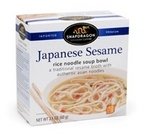Is JAPANESE SESAME SOUP BOWL Vegan?

Description
Rich, toasty flavor with a smooth, velvety texture; often described as mildly savory and warming. Commonly served as a starter or light meal, used for sipping, dipping, or pairing with noodles and rice. Reviewers note consistent taste, convenient single-serving portions, and authentic, comforting character, simple reheating and reliable portioning routines.

Description
Rich, toasty flavor with a smooth, velvety texture; often described as mildly savory and warming. Commonly served as a starter or light meal, used for sipping, dipping, or pairing with noodles and rice. Reviewers note consistent taste, convenient single-serving portions, and authentic, comforting character, simple reheating and reliable portioning routines.
Ingredients
RICE NOODLES: RICE, WATER. SEASONING: SALT, MALTODEXTRIN, SOY SAUCE POWDER (HYDROLYZED SOY PROTEIN, SALT), CREAMER (GLUCOSE SYRUP, PALM OIL, SODIUM CASEINATE), CANE SUGAR, DISODIUM INOSINATE, DISODIUM GUANYLATE, PEPPER, GINGER, GARLIC, ONION. SEASONING OIL: SESAME OIL.
What is a Vegan diet?
A vegan diet excludes all animal-derived foods, including meat, poultry, fish, dairy, eggs, and honey. It focuses on plant-based sources such as fruits, vegetables, grains, legumes, nuts, and seeds. Many people choose veganism for ethical, environmental, or health reasons. When well-planned, it provides sufficient protein, fiber, and antioxidants, though supplementation or fortified foods may be needed for nutrients like vitamin B12, iron, and omega-3 fatty acids. Vegan diets are associated with lower risks of heart disease and improved digestion but require mindfulness to ensure balanced and complete nutrition.
Similar Products
ORIGINAL MULTI-SEED CRUNCHY, BAKED CRACKERS WITH SESAME, QUINOA, FLAX AND AMARANTH SEEDS WITH A RICH AND SAVORY TASTE, ORIGINAL
Campbell's® Condensed Condensed Tomato Soup
MARUCHAN RAMEN NOODLE SOUP CHICKEN FLAVOR
Lipton Recipe Secrets Onion Recipe Soup & Dip Mix
Kikkoman Gluten Free Panko Japanese Style Bread Crumbs - 8oz


